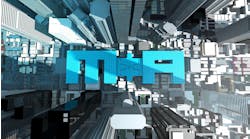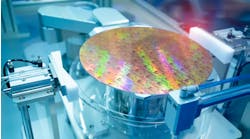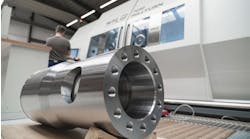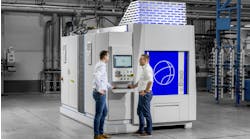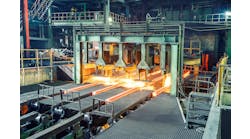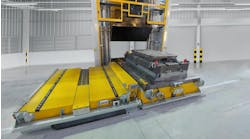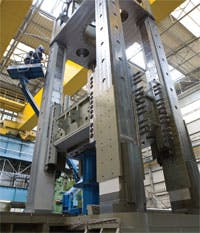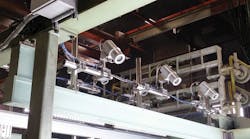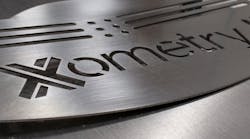Getting Perforated Metal Sheets Extremely Flat
The U.S. company Hendrick Manufacturing shows how sustaining consistent improvements in the production process can be achieved with the right machine equipment. Specifically, it achieved this consistency with a high-precision leveler from Schnutz GmbH of the b+s group.
Since its founding in 1876, the Hendrick Corporation in Carbondale in the coal belt of Pennsylvania (USA) has been producing perforated sheets in various designs. Initially only screens for the separation of coal, it later added other markets such as perforated sheets for medical technology, the automotive industry, water & air filtration, and architecture.
With precisely manufactured perforated sheets an impressive architectural design of buildings is possible—both indoors and outdoors. The demands on the precision of perforated sheet panels for cladding exterior walls are high. It becomes even more difficult for interiors.
Decorative perforated sheets, for example for the entrance area of companies, typically have large visible surfaces. The smallest unevenness is immediately noticeable. The highest precision and evenness are mandatory for leveling these perforated sheets.
Why do perforated sheets have to be leveled? Punching or stamping creates stresses and unevenness in the material that make further processing almost impossible. Leveling prevents time-consuming manual reworking and metal sheets must be as flat as required for later use.
To ensure that Hendrick Manufacturing can continue to meet the demand for highly flat perforated sheets, the company decided to purchase a high-precision leveler from Schnutz after researching the market.
"From the beginning, we always got the support we needed. For initial tests with our typical perforated sheets, Schnutz put us in touch with a company in Germany that works with the targeted model. We were able to take as much time as we needed with the tests and also learned a lot about the machine," says Alex Tonkin, Manufacturing Engineer at Hendrick.
In November 2022, the high-precision leveler was successfully commissioned at the Carbondale plant operating exclusively in stand-alone mode. One of the reasons for buying from Schnutz was that its high-precision levelers are optimized for special applications and differ significantly from conventional levelers.
Small Footprint and Easy Maintenance
Dr.-Ing. Lutz-Stefan Heinrich, Managing Director of Schnutz GmbH, explains what the differences are:
"We design the drive area to be particularly compact in order to keep the footprint as small as possible. Leveling and backup rolls are installed with their bearings in cassettes that can be removed and replaced as a unit with little effort. This trick makes maintenance easier and allows the use of leveling rolls with different diameters. It also extends the range of applications for our leveler.
The perforated metal sheets are fed into the machine manually, with the operator being supported by a special-design feed driver. Even sheets with a high oil content on the surface can be reliably leveled with this. A cleaning device cleans the leveling rolls without the need for removal—an important feature that reduces downtime. In addition, a special coating on the infeed side leveling rolls increases grip. This makes malfunction during operation less likely.“
The high-precision leveler is designed for perforated metal sheets up to 63 in. (1,600 mm) wide with a thickness of 0.01 to 0.02 in. (0.3 to 0.5 mm). These values depend on the yield strength (here 300 MPa) and the open cross-section. The speed can be between 6.5 and 65 ft/min (2 to 20 m/min).
Precision Is Key
"With other machines, we used to have marks in the material, especially in the places where the metal sheets first enter the leveler. We therefore often had to leave extra material on the sheets and cut it off after leveling to remove these marks. With the Schnutz high-precision leveler, this is no longer necessary,“ says Tonkin.
Another aspect of the acquisition of new machines is the increase in productivity. One possible criterion for levelers is the number of passes until a sheet has the desired flatness.
"Sheets with small, open areas and large, fixed edges are difficult to straighten. With the new machine, we need a maximum of two passes even for difficult perforations. With increasing experience, it should be possible to reduce this to one pass in many cases.“
Set Optimal Settings
"All relevant settings can be adjusted, checked and, if necessary, corrected on the tiltable control panel. Thus, the time for training new skilled workers is pleasantly short," praises Tonkin.
Proven parameters can be stored under the product name and recalled later. All operating elements can be comfortably operated with the prescribed safety gloves.
All in all, Tonkin gives a thoroughly positive verdict on the precision leveler: "We are very satisfied and would choose Schnutz again.“
With the new precision leveler, Hendrick Manufacturing can serve interior design customers better than before and open up further extremely demanding markets.
